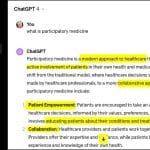The nascent field of Participatory Medicine is currently in the “debating and defining” stage. It has been tentatively defined by the steering group of the Journal of Participatory Medicine as: …a cooperative model of health care that encourages and expects active involvement by all connected parties (health care professionals, patients, caregivers, etc.) as integral to the full continuum of care. The ‘participatory’ concept may also be applied to fitness, nutrition, mental health, end-of-life care, and all issues broadly related to an individual’s health.
Much of this definition will be fleshed out by sharing examples and anecdotes which, in some way encourage or inspire others, whether patients or providers, to begin functioning in a more participatory mode.
I was treated to an example of this today: I founded an online health information service to which a client sent the following question: “Would a low Glycemic Index diet affect macular degeneration in any way?”
My answer was: “I didn’t know, but would check with one of my colleagues in the Jones Eye Institute“, an Ophthalmic Institute that is a part of the University of Arkansas for Medical Sciences. In a short time, I received the following reply from my friend in the Ophthalmology Department:
“I was not aware of any association until today!
It was found that a low glycemic index reduces the risk of developing macular degeneration.
This is one of the references:”:
Am J Clin Nutr. 2007 Jul;86(1):180-8.
Association between dietary glycemic index and age-related macular degeneration in nondiabetic participants in the Age-Related Eye Disease Study.
Chiu CJ, Milton RC, Gensler G, Taylor A.
Jean Mayer US Department of Agriculture, Human Nutrition Research Center on Aging at Tufts University, Boston, MA 02111, USA.
BACKGROUND: Age-related macular degeneration (AMD) is the major cause of irreversible blindness. AMD appears to share several carbohydrate-related mechanisms and risk factors with diabetes-related diseases, including retinopathy and cardiovascular disease (CVD); however, to date, only one small study has addressed this issue.
OBJECTIVE: The objective was to test the hypothesis that dietary glycemic index (dGI), which has been related to the risk of diabetes and CVD, is associated with the risk and severity of AMD in nondiabetic elderly populations.
DESIGN: Dietary information was obtained from 4099 participants aged 55-80 y (56% women) in the Age-Related Eye Disease Study (AREDS). A total of 8125 eligible eyes at baseline were classified into 1 of 5 AMD groups according to the size and extent of drusen, the presence of geographic atrophy, and neovascular changes. We used a generalized estimating approach to evaluate the relations between dGI and risk and severity of AMD with eyes as the unit of analysis.
RESULTS: Compared with eyes in the first quintile of dGI, eyes in the fourth and fifth quintiles had a significantly or suggestively higher risk of large drusen, geographic atrophy, and neovascularization. The multivariate-adjusted odds ratios (95% CIs) for the highest quintile were 1.42 (1.09, 1.84), 1.78 (0.81, 3.90), and 1.41 (0.95, 2.08), respectively, of which only the odds ratio for large drusen was significant. A significant positive relation between dGI and severity of AMD was also noted (P for trend < 0.001). There was a 49% increase in the risk of advanced AMD (geographic atrophy plus neovascularization) for persons with a dGI higher than the sex median (women: >or=77.9; men: >or=79.3). This result indicated that 20% of prevalent cases of AMD would have been eliminated if the AREDS participants consumed diets with a dGI below the median.
CONCLUSION: The association between dGI and AMD from the AREDS cross-sectional analysis at baseline suggests that a reduction in the dGI, a modifiable risk factor, may provide a means of diminishing the risk of AMD.
PMID: 17616779 [PubMed – indexed for MEDLINE]
I thought this was a beautiful example of what participatory medicine is all about! This is a very experienced, senior, academic ophthalmologist who specializes in caring for patients with macular degeneration and he was not aware of this association. The patient must have seen something that referenced this or a similar work and, thus, asked me the question.
Asking my colleague would have been where most people met a dead end. But this doctor spent the time and effort to do some research and responded with this potentially important piece of research confirming that, in fact, there is an association between glycemic index and macular degeneration. Bravo, and thanks to him for his efforts and his attitude!
To emphasize the obvious points, patient outcomes will be improved if we encourage them to ask questions, and to enlighten us when they come across something that may be relevant.
Equally important, it is critical for providers to remain open to being guided and educated by our patients.
We need their help to become more effective clinicians.






Recent Comments